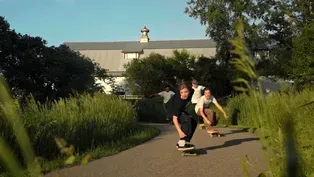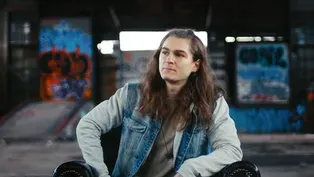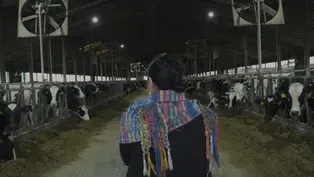Made Here
Artifacts of the Present: Portrait of A Printmaker
Clip: Season 19 Episode 11 | 14m 17sVideo has Closed Captions
A moving and poignant documentary portrait of a printmaking artist facing mortality.
Directed by Willow O'Feral and Brad Heck, Guilford, Vermont. Artifacts of the Present is a powerfully moving and poignant documentary portrait of a printmaking artist facing mortality, and immerses the viewer in printmaking artist Brian D. Cohen’s home, workshop, and art. A short film selected from the 2023 Made Here Film Festival, co-produced by Vermont Public and VTIFF.
Problems with Closed Captions? Closed Captioning Feedback
Problems with Closed Captions? Closed Captioning Feedback
Made Here is a local public television program presented by Vermont Public
Sponsored in part by the John M. Bissell Foundation, Inc. | Learn about the Made Here Fund
Made Here
Artifacts of the Present: Portrait of A Printmaker
Clip: Season 19 Episode 11 | 14m 17sVideo has Closed Captions
Directed by Willow O'Feral and Brad Heck, Guilford, Vermont. Artifacts of the Present is a powerfully moving and poignant documentary portrait of a printmaking artist facing mortality, and immerses the viewer in printmaking artist Brian D. Cohen’s home, workshop, and art. A short film selected from the 2023 Made Here Film Festival, co-produced by Vermont Public and VTIFF.
Problems with Closed Captions? Closed Captioning Feedback
How to Watch Made Here
Made Here is available to stream on pbs.org and the free PBS App, available on iPhone, Apple TV, Android TV, Android smartphones, Amazon Fire TV, Amazon Fire Tablet, Roku, Samsung Smart TV, and Vizio.
Providing Support for PBS.org
Learn Moreabout PBS online sponsorshipEvery week, Made Here features the best films from Vermont and the region.
Made by and about your neighbors.
This season highlights the people and places that make this place great.
Unique stories you wont find anywhere else.
Theres a kind of a craving to the kinds of work, the kinds of manipulations, the motions, the materials and love the metal.
Umm, I love that differences in texture and the differences in depth of the metal.
And I think ultimately it comes down to that my hands are kind of doing their own thing because they just love to be there doing that.
My hands are just going to work, my hands will start working and I'm kind of all there and kind of not there.
And I'm all about making things.
I'm all about my hands.
It really is about that's just my primary orientation to life, to the world is manipulative.
I don't mean emotionally, it's crafting, it's shaping.
And that's what I've done so much of, and I'm still doing a more focused on that than ever.
And so that's who I was.
That's what I leave.
I was diagnosed two years ago with acute myeloid leukemia, and I ended up having a bone marrow transplant from my sister.
And it's the only possibility of a cure, but it doesn't work in a good number of cases.
Then I relapsed and there's no cure there.
There's like, okay, what happens when you die?
And I was listening to David White.
He's kind of a new age Irish poet, his beautiful voice.
And he says, We can't know.
And I was like, Oh, I totally agree.
What a relief.
And just cry because like, I don't have to worry about that.
And they're just like, how you die?
And I was reading Montagnier, the French SS and he's like, It'll work out.
You don't have to figure that out.
So that was like two out of three things I don't have to worry about.
I'm not going to think about it.
What happens, how it happens.
Third thing, how do you live your life that matters?
I have control over that.
To a certain extent, I will make choices about how I live my life, so I kind of focus my time and they're just three big categories of time.
I am very complain about my care.
I want every chance.
I won't do anything to subvert my own health.
And I work on my work mostly on older plates.
And the other thing I spend time with the people I love, they're really good people who you can be utterly open and connected to or like they become clearer who they are and all that you can share.
And the people who are not worth your time also become more clear.
So I just have really reoriented to spending more time with those people that have mattered to me and that work.
My father is a big influence.
He's still living in his nineties as an aviation illustrator.
So I grew up around airplanes and history and transportation and some of that caught on.
But the plates themselves, I really think of them as, you know, just working out some little kind of model scenario, some representation of something bigger and more complicated and ungovernable.
But I'm doing it within my kind of manipulative scope I did a number of years ago on etching of a tsunami, now called a Rogue Wave Tsunami.
I learned it something a little bit different and has a little ship and a big wave sort of based on hokusai's great wave coming down over this ship.
And it was I was doing it.
I was thinking, I am just like an eight year old boy in the bathtub, like splashing the rubber boats.
And that's really kind of all I'm doing, what I'm doing as a grown up, the joy of working on them, the grace is working on the plates.
And those plates don't mean anything on their own.
It's a secondary subsequent staff creating the prints, and it can go incredibly badly.
So you can think, Oh my God, this is just perfect.
This was it's exactly what I want.
And it doesn't come out at all where you think, Yeah, it's like so diaphanous, pathetic that I think the walk yes, the printing is, you know, where this thing comes into being and where it can be seen.
It's naked, it's exposed and it can be charged.
But that process is so indirect and so undefinable and ungovernable.
I don't give I never give up, but I never feel like that's all get you know, I got this never I'm never confident about it, but that actually feels good.
Yeah, cool.
So what would be great?
Wouldn't it be?
I don't want to be minding the clock.
I want to be, you know, working on my place, right?
Hanging with my friends.
I want to be doing the things I never felt I had done a real good job with a career.
I didn't conceive of it properly.
I didn't do the right things.
I think I didn't care that much and I had a lot of other things to do.
I had a family to raise.
I was teaching, I was making the work.
Making the work and getting it in the world are two different things.
So I always kept my place.
I didn't cancel them or destroy them.
I document them.
I put them in some condition where they can be printed and kept and stored.
And I'm creating these little tokens, these little time capsules.
I thought that it would be nice to kind of pull it together and give it a second life in a way, or at least an opportunity for people to to see it and experience it.
I had been a painter and printmaking had more just kind of had more attraction for me.
I had more mystery, it had more, more of a handle on.
I could just really dig into it, get dirty with it, love it.
The craft loved the history, loved its practitioners.
I think a lot about the social aspect of art and for me printmaking it was, you know, it was this group I felt I could be one of.
And I never felt that with painters, really, there's a little drama to this because you got to have on the whole grass and push it.
And yes, but I need to get right here.
So the pressure so that's great that that was like, yeah, that's how it's supposed to happen.
So I think a lot about art.
Art's the most amazing thing in the sense in so many senses.
But in that an artist like you once said, art is a gift from tomorrow's debt, tomorrow's tomorrow's a living.
And it's like it.
You know, most of these people are dead, right?
But you can look at it.
It's like, I mean, that's amazing.
That's powerful.
That hits me.
That touches me, that speaks to me so directly.
And that's a gift.
You know, I listen to Schubert, it's like kind of shitty life and happy early death.
Wow.
You gave that to me 200 years later.
You didn't know it when you did leave it and totally vainglorious thought thought on my part that I might be part of that.
But does that art can do that?
I did art.
I want to be in that mix.
If it's to be Vermont Public partnering with local filmmakers to bring you stories made here for more visit vermontpublic.org
Video has Closed Captions
AXEL is an experimental documentary exploring themes of childhood and rebellion. (15m 46s)
Video has Closed Captions
Prohibited, abandoned and unexplored sites are hidden in Montreal. (16m 4s)
Video has Closed Captions
In Vermont, Alejandra's cooking bridges cultures, forging community & belonging. (9m 32s)
Providing Support for PBS.org
Learn Moreabout PBS online sponsorshipMade Here is a local public television program presented by Vermont Public
Sponsored in part by the John M. Bissell Foundation, Inc. | Learn about the Made Here Fund














